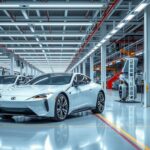Latest ESG Updates: Carbon Markets, Hydrogen Commitment, and Clean Energy Innovations
China expands its carbon trading market to include more industries, Airbus commits to hydrogen aircraft despite delays, European banks face fines for antitrust violations, and Japan introduces turquoise hydrogen as a new energy source.
Recent updates in Environmental, Social, and Governance (ESG) matters reveal significant developments, including China’s expansion of its carbon trading market, Airbus reaffirming its commitment to hydrogen-powered aircraft, European banks facing antitrust penalties, and Japan introducing turquoise hydrogen.
China’s carbon trading scheme has expanded to encompass additional industrial sectors, namely steel, cement, and aluminium smelting. This development will increase the carbon emissions covered by the trading market to a substantial 8 billion metric tons, representing 60% of the nation’s total emissions. Consequently, approximately 1,500 firms will now be obligated to manage their carbon emissions via credits, reflecting China’s acceleration towards meeting its carbon goals.
Airbus, during its Aircraft Summit 2025, reiterated its dedication to hydrogen-powered aircraft despite facing delays in the development timeline until 2035. The aviation giant has made significant progress in sustainable technology through initiatives such as the NEO programme and sustainable aviation fuels (SAF). Airbus unveiled new concepts for single-aisle aircraft and updated its ZEROe roadmap, with Bruno Fichefeux, Head of Future Programmes stating that “Hydrogen is at the heart of our commitment to decarbonise aviation.”
In a recent ruling, the European Court upheld fines amounting to €371 million against UBS, UniCredit, and Nomura for antitrust violations based on improper exchanges of sensitive business information. Although the initial penalties were reduced slightly for some banks, they expressed intentions to challenge this outcome further. This decision illustrates the critical need for businesses to navigate emerging financial requirements diligently using appropriate ESG tools.
Japan has uncovered a new form of hydrogen known as turquoise hydrogen, which is considered clean, cost-effective, and promising for future energy sources. Utilizing methane pyrolysis, this method offers a long-lasting energy solution while effectively mitigating carbon emissions. Ebara, a Japanese industrial machinery manufacturer, aims to commercialize turquoise hydrogen technology by 2026, positioning Japan as a potential leader in advancing clean energy alternatives and reducing reliance on fossil fuels.
Overall, these ESG updates highlight continuing efforts towards sustainable practices across multiple sectors, showcasing significant progress and innovative solutions in response to climate challenges and regulatory frameworks.
In conclusion, the recent developments within the ESG landscape illustrate notable strides towards sustainability, particularly with China’s carbon trading market expansion, Airbus’s focus on hydrogen aircraft, legal challenges faced by major banks, and Japan’s exploration of turquoise hydrogen. These efforts collectively reinforce the global commitment to reducing carbon emissions and transitioning towards cleaner energy sources.
Original Source: impakter.com








Post Comment